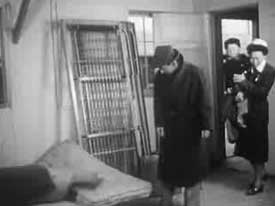 A subtly yet shockingly racist film Challenge to Democracy (1944) describes with pride & joyful intonation the "transfer" in spring & summer of 1942 of Japanese Americans to concentration camps, the majority of whom were American citizens.
A subtly yet shockingly racist film Challenge to Democracy (1944) describes with pride & joyful intonation the "transfer" in spring & summer of 1942 of Japanese Americans to concentration camps, the majority of whom were American citizens.
Narrated by John Baker, he calls the camps "wartime communities in out of the way places" as Japanese Americans are shown being loaded on & off trains.
The narration states rather incongruously there was no individual disloyalty implied by removal of the Japanese from their homes, & it admits that two-thirds of those sent to "wartime communities" were American citizens born in America, the other third "their parents & grandparents" born in Japan. "They are not under suspicion. They are not prisoners. They are not internees."
Of course they were too internees whose camps were surrounded by barbed wire with gun towers & guards to prohibit escape, & a few who tried to get through fences were in fact shot during the internment.
So this little film is telling amazing whoppers within its first minute. It will continue to tell whoppers for 18 minutes, though its surprising the admissions the film does make. For by the time this film was released the internment camps were emptying out & the propaganda of the piece had to perform contradictory functions: pretend that government actions were justified, plus establish the innocence of the internees so they wouldn't be beaten up, stigmatized, or murdered after release.
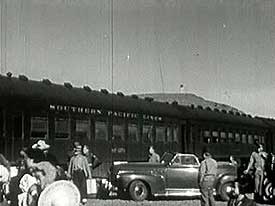 The government had not as yet begun to feel the impact of shame & error, so were willing to admit these people were innocent & were packed into small "barren & unattractive" rooms, in mainly desert areas (except the Arkansas camp) that had never been settled or farmed because such miserable places. The government had not as yet begun to feel the impact of shame & error, so were willing to admit these people were innocent & were packed into small "barren & unattractive" rooms, in mainly desert areas (except the Arkansas camp) that had never been settled or farmed because such miserable places.
To keep food costs well under 45 cents a day per resident, it was expected from the beginning of the project that the internees would grow their own food. In 1943 all the camps were producing their own crops.
The industrious labor of the internees in turning scrub land or desert into productive land is praised by the narrator. For these labors the internees earn $13 to $19 a month which they can spend in the camp store for toiletries & other household needs & haircuts & shoe repair & so on, oh what lucky doggies to have co-ops & spare change of their very own. Baker is chipper about all this, & has a warm friendly voice unlike the stentorial authoritative narrator of most propaganda films of the '40s.
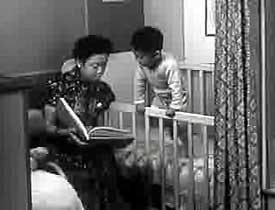 The pictorial record given the viewer, & the narrator's text, strive in pretence to prove these rooms were not crowded. After the families decorated their little rooms, they're shown looking like first-rate apartments anyone would be glad to live in. The pictorial record given the viewer, & the narrator's text, strive in pretence to prove these rooms were not crowded. After the families decorated their little rooms, they're shown looking like first-rate apartments anyone would be glad to live in.
The truth was they were clapboard apartments that wouldn't've passed muster as barn stalls, & the only reason winter winds weren't continuously blowing through them is because newspapers & cloth were shoved between the loose-fitting boards of the thin walls. A single sixty watt lightbulb lit the miserable little rooms & when that burned out, they could only get another if they could buy one.
Except for bed cots, they had to make their own furniture. "The family's own furniture was in storage on the west coast," Baker lies. In reality the government auctioned off those possessions as well as deeded properties, so that most of these families lost everything & had nothing to return to upon release.
In their small spaces in the camps they also had woodstoves, & were sent outside the camps under armed guards to gather firewood to keep warm, even where barren land could never provide sufficient wood for cold nights & winters.
The film wants to give the impression that there was no hardship involved in all this, with great schools for the kids, such good education in fact that these folks would be able to get better jobs than they had formerly, so what a good thing it is they got interned & trained for something useful since owning their own farms & nurseries & businesses had been such a dreadful way of life before the war improved things for them.
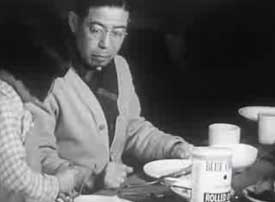 It is further preposterously contended that the internees had great medical care. We're shown advanced medical facilities within the camps, operated by the doctors from the Japanese community who're earning $19 a month. The truth is many Japanese died in the camps specifically because of inadequate medical care. It is further preposterously contended that the internees had great medical care. We're shown advanced medical facilities within the camps, operated by the doctors from the Japanese community who're earning $19 a month. The truth is many Japanese died in the camps specifically because of inadequate medical care.
Everyone gets to vote just as though they weren't interned, lies the narrator, ignoring entirely the American law that denied Issei the right to vote at all, denied them the right to obtain citizenship, or the right to own land. The largest single population interned were below voting age.
As for the remaining percentage who did in theory have the right to vote, the Wyoming legislatore in February 1943 was first to pass a law prohibiting Japanese in the Heart Mountain Camp from voting, & region by region this right was banned for internees even if born in America & of voting age.
The narrator brags that no money is spent for recreational purposes, but that the Japanese made or purchased all the equipment required to establish hundreds of baseball teams. Japanese love of baseball is legendary. Just like they love their adoptive country, both before & after it betrayed them.
The population of the camps included "many well known artists," & the artwork shown in this film may be the first public acknowledgement of this important aspect of life in & documentation of the camps.
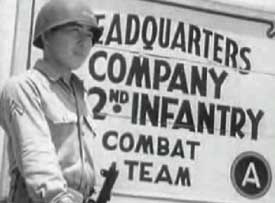 The film speaks of the difficulty of finding permanent places to send the Japanese when eventually they were released & had their civil rights restored. At first only those who had signed loyalty oaths were permitted to leave. The film speaks of the difficulty of finding permanent places to send the Japanese when eventually they were released & had their civil rights restored. At first only those who had signed loyalty oaths were permitted to leave.
Young men willing to die in the European theater were the very first allowed to leave the camps. Second were those who "volunteered" to do farm labor serving white farmers, being paid in sugar.
Eventually all were permitted to leave but some had to remain, as there was no place for them to go. The west coast communities that had existed before the war had been reduced to a thinly dispersed diaspora.
The film does not note that the difficulties with the final releases was due to the homes & farms & businesses they had formerly owned having been divied up among caucausians as spoils of war, never to be regained. The film is explicit, however, that no tax dollars were wasted solving these issues.
Because the point of this film is to convince viewers that what Roosevelt himself called "concentration camps" were pretty nice places that caused no trauma to anyone, overt language of racism like the word "Japs" are not used, inflammatory claims about a threat posed by Japanese in America is not promulgated, & indeed no reason is even hinted at as to why this horrendous event needed to happen.
And yet just about every statement made in this "gentle" film amounts to a catalog of lies -- great medical care where there was very little, voting rights where none existed, "not prisoners" though they were contained in barbed wire by armed guards, private possessions stored for the duration of the war when in fact auctioned away, not to mention lies of omission such as sons of military service age becoming the most decorated soldiers of the war, with the highest casualty rates, while their parents & young siblings lived in barn stalls with guns pointed at them.
copyright © by Paghat the Ratgirl
|
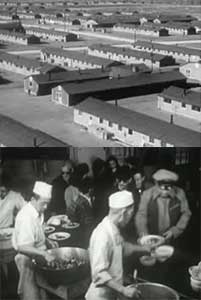

 The government had not as yet begun to feel the impact of shame & error, so were willing to admit these people were innocent & were packed into small "barren & unattractive" rooms, in mainly desert areas (except the Arkansas camp) that had never been settled or farmed because such miserable places.
The government had not as yet begun to feel the impact of shame & error, so were willing to admit these people were innocent & were packed into small "barren & unattractive" rooms, in mainly desert areas (except the Arkansas camp) that had never been settled or farmed because such miserable places. The pictorial record given the viewer, & the narrator's text, strive in pretence to prove these rooms were not crowded. After the families decorated their little rooms, they're shown looking like first-rate apartments anyone would be glad to live in.
The pictorial record given the viewer, & the narrator's text, strive in pretence to prove these rooms were not crowded. After the families decorated their little rooms, they're shown looking like first-rate apartments anyone would be glad to live in. It is further preposterously contended that the internees had great medical care. We're shown advanced medical facilities within the camps, operated by the doctors from the Japanese community who're earning $19 a month. The truth is many Japanese died in the camps specifically because of inadequate medical care.
It is further preposterously contended that the internees had great medical care. We're shown advanced medical facilities within the camps, operated by the doctors from the Japanese community who're earning $19 a month. The truth is many Japanese died in the camps specifically because of inadequate medical care. The film speaks of the difficulty of finding permanent places to send the Japanese when eventually they were released & had their civil rights restored. At first only those who had signed loyalty oaths were permitted to leave.
The film speaks of the difficulty of finding permanent places to send the Japanese when eventually they were released & had their civil rights restored. At first only those who had signed loyalty oaths were permitted to leave.